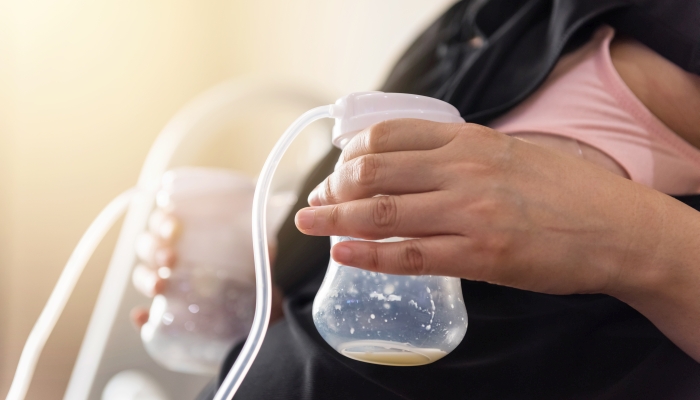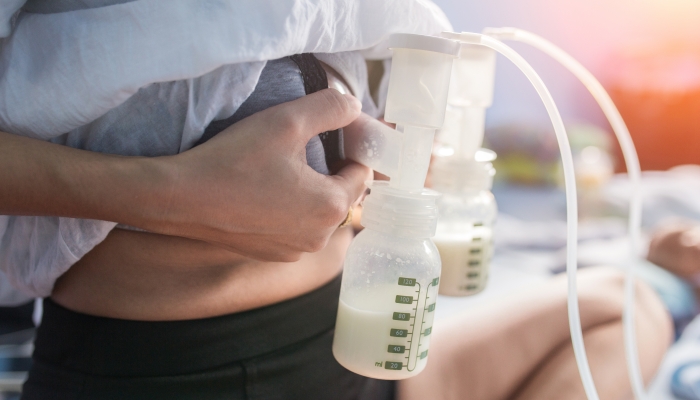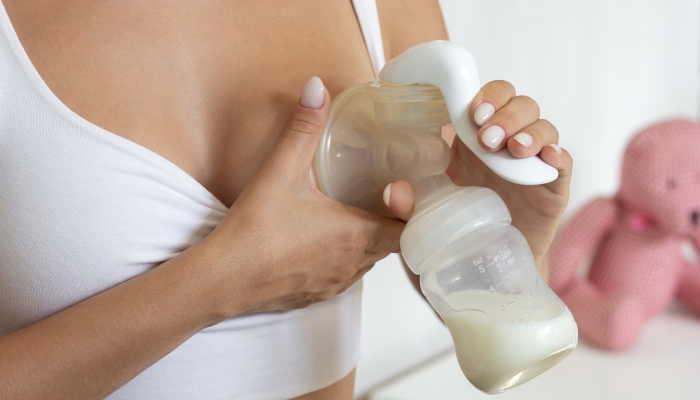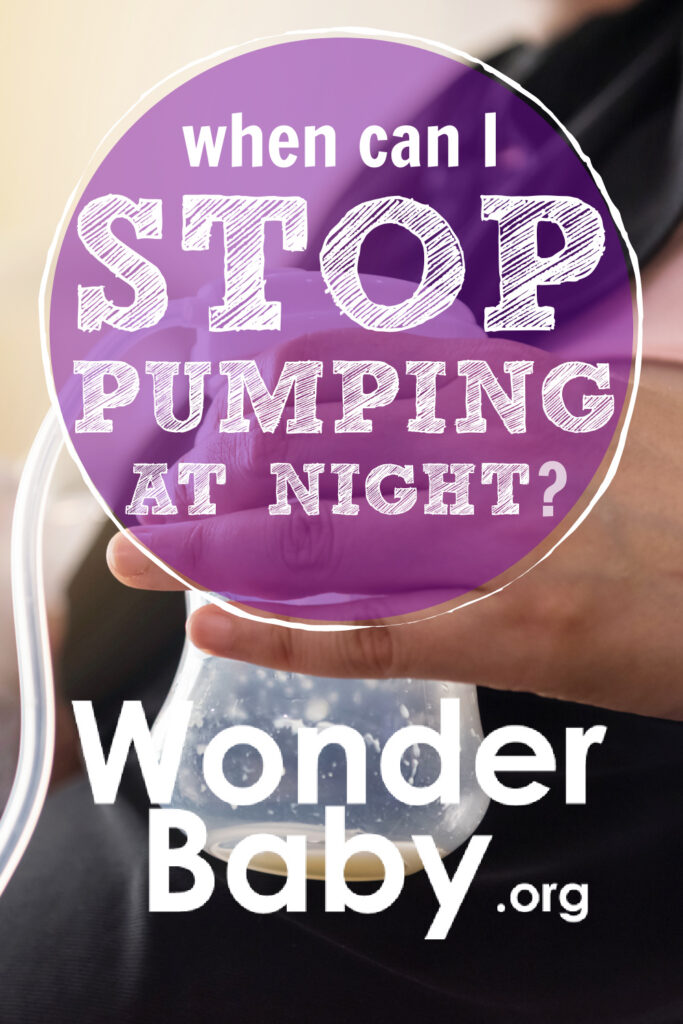When Can I Stop Pumping at Night?

- Pumping moms should try to pump around the same time that their baby eats.
- When you have a newborn, you will need to pump every 3-4 hours, even at night.
- You can drop your nighttime pumping session when your baby is about 6 months old.
- Your milk supply may decrease if you don’t pump at night.
Many mothers choose to become exclusive pumpers for a variety of reasons. Pumping allows someone else to have the opportunity to feed your baby breastmilk, and some NICU babies can only take breastmilk that has been pumped. Some babies can’t get a good latch while breastfeeding, and for some moms, breastfeeding is uncomfortable or even painful.
Whether you choose to be an exclusive pumper or combination feeder, you will have to wake in the middle of the night while your baby is young for night feedings or a night pump session. As your baby gets older, you will probably start to wonder: When can I stop pumping at night?
Do You Really Have to Pump at Night?
You may choose exclusive pumping to allow your partner to take over some of the nighttime feedings. While this can be very helpful, you will still have to pump at night. Unfortunately, exclusively pumping doesn’t mean you won’t have to get up in the middle of the night.
Experts at La Leche League recommend pumping every two to three hours with a newborn baby, even during the night. This will maintain your milk supply and keep you from getting uncomfortably engorged.
Usually, you can follow your baby’s lead. This means that as your baby starts sleeping for longer stretches, you can go longer stretches between pumping sessions.
Make Night Pumping Sessions Easier
Even though you will still have to wake up to use your breast pump at night, there are things you can do to make your night pumping session easier.
- Keep your breast pump on your night stand in the same room as you.
- Have your significant other clean your pumping parts so you can go back to sleep after you pump.
- Use a breast pump with two pumps so that you can empty both breasts at the same time.
- Have your pumping sessions when your baby wakes to have longer stretches of uninterrupted sleep.
- Prepare for the night ahead by having your pump and pumping parts ready to go and within reach. You can set up a pumping station right next to your bed with all of your supplies.
- Use a night light instead of bright overhead lights during your pumping session to help you fall asleep more easily when you are done.

When Can You Stop Pumping at Night?
If you want to keep your milk supply up, you will have to include middle-of-the-night pumping sessions for a few months. As your baby gets older, you can drop pumping sessions while still providing enough breast milk for your baby.
Recommended pumping schedule:
Here is a basic outline of how often you should pump according to your baby’s age:
0-3 months
Exclusive pumping for a newborn will require six to eight pumping sessions per day. At night, this means pumping right before you go to sleep, once or twice in the middle of the night, and once in the early morning hours, around 5 or 6 a.m.
3-6 months
To maintain a milk supply for a 3 to 6-month-old baby, you will need to pump five or six times per day. This means pumping right before bed, once in the middle of the night, and once right when you wake up.
6-12 months
Around six months, exclusively pumping moms can drop pumping sessions from the middle of the night. Have your last pumping session right before you go to bed, and then pump again first thing in the morning.
12 months and older
When your baby reaches a year old, your baby will be eating more solid food and less breastmilk. Exclusively pumping moms can continue to pump once or twice a day for as long as they want to continue providing breast milk for their children.
When you are completely finished with pumping, you can donate your breast pump to another mom in need.
Will Not Pumping at Night Decrease My Milk Supply?
Every time you pump or breastfeed, you are telling your body that it needs to make more milk. During each pumping session, your body releases prolactin, which is the milk-making hormone. If your prolactin levels get too low, your body will stop making as much milk.
Your body makes more milk based on demand. That’s why power-pumping helps you make more breast milk, and moms with multiples can have enough milk supply to breastfeed both babies.
When you skip a pumping session at night, you are telling your body that you do not need breast milk at that time. This lowers your prolactin levels and your milk output. Skipping one session is okay every once in a while, but if you start dropping night pumping too frequently, your supply will be affected.
Ultimate Guide on How to Stop Pumping at Night
Making any changes to your breastfeeding or pumping schedule can be challenging. However, there are ways to make the transition away from pumping at night easier.
Schedule
When you are ready to stop pumping overnight, you can slowly adjust your schedule to avoid engorgement. If you normally woke up at 1:00 a.m. to pump, you can slowly adjust your schedule to increase the time between sessions. You might change your pumping time to 2:00 a.m. for a few days, then 3:00 a.m., and continue on until you can sleep all night without pumping.
Shorten Sessions
Similarly to slowly adjusting your schedule, you can also slowly pump less milk with each session. Continue pumping at your usual time, but only pump enough to help yourself feel comfortable. Over time, your breasts will produce less milk until you can completely stop pumping overnight.
Ice Packs
Some mothers can drop their middle-of-the-night breast pumping by using ice packs to relieve the discomfort of engorgement. If you can manage your discomfort with cool washcloths or ice packs, you

How to Prevent Clogged Ducts When You Stop Pumping at Night
It can be tempting for a new mom to just stop pumping at night cold turkey. However, this can lead to clogged ducts and even mastitis. When you and your baby are ready to sleep through the night, try to wean yourself slowly.
Power Pumping Problems
Many moms make the mistake of having a power-pumping session right before bed to try to empty their breasts before sleeping. Unfortunately, this only tells your breast tissue to make more milk and can make nighttime engorgement even worse.
Do not try to pump extra milk right before bed to start the night with empty breasts. While this may seem like a good idea, you’ll notice that your breasts make more milk in response to the increased demand after a few nights.
Treating Clogged Ducts
If you do happen to get clogged milk ducts when you change your pumping schedules, there are a few things you can do to help clear them up quickly:
1. Pump more frequently.
You may have to delay your schedule change until your clogged ducts clear up. If you drop pumping sessions while already suffering from clogged ducts, you could make them worse.
2. Use a heating pack while pumping.
A heat pack can help milk flow more easily and unclog your milk duct. This can also help with pain.
3. Try breast massage.
Use your hand to massage your breast with the clogged milk duct. Massaging your breast while pumping is the most effective.
4. Take a warm shower.
Like using a heating pack, warm showers are extremely effective ways to relieve a clogged milk duct.
FAQs
How long can you go without pumping before your milk dries up?
Milk supply is different for every mother. For some, milk supply will dry up in a few days, and others will continue making a small amount of breast milk for a few weeks or even months.
Will one day of not pumping affect breast milk supply?
While skipping one pumping session won’t have lasting effects, going an entire day without pumping can impact your breast milk supply, and you will have to be consistent with pumping in the following days to reestablish your supply.
While your supply won’t completely dry up in 24 hours, going that long between pumping sessions does put you at risk for clogged milk ducts and mastitis, a painful infection in your breast tissue.
If you do not have access to your breast pump for an extended time, you can use hand expression to maintain your supply and avoid engorgement.
Can breast milk come back after drying up?
Breast milk can come back after drying up, but it takes a lot of work. Relactation requires pumping 8 to 12 times per day for about 20-30 minutes per session, including through the night. Some mothers have to continue to supplement with formula, even after they begin relactation, but some can switch back to feeding their babies breast milk exclusively.
Should breastfeeding moms pump at night?
If you are breastfeeding, the most convenient thing to do is simply breastfeed your baby on-demand through the night. However, mothers struggling with supply issues may have to add a pumping session during the night to help increase their supply.
Can breast milk sit out overnight?
After you pump in the middle of the night, it can be tempting to leave your pumps full of breastmilk out on your nightstand and deal with them in the morning. However, freshly pumped milk needs to be put in the refrigerator if it is not going to be used right away.
Freshly pumped milk is safe at room temperature for about four hours. After that, it needs to be refrigerated. Breast milk can last in the refrigerator for 4 days and can last in the freezer for up to 6 months.

The information WonderBaby provides is not intended to be, and does not constitute, medical or other health advice or diagnosis and should not be used as such. Always consult with a qualified medical professional about your specific circumstances.
Related Posts

Breastfeeding, Sleep
Sleep and Breastfeeding: A Comprehensive Guide for Nursing Moms
Many people assume breastfeeding and sleep training don’t go together, but it is possible to help your baby sleep better while continuing your breastfeeding journey.

Breastfeeding
Comfort Nursing: Pros, Cons, and How to Stop
Find out what comfort nursing is, when should you worry about it, and how to stop or limit your baby's comfort nursing (especially at night!).

Breastfeeding, Product Reviews
5 Best Breastfeeding Chairs for Nursing Moms of 2023
Whether you want a gentle rock, a smooth glide, or a cozy cuddle to soothe your baby to sleep, you’ll have your pick of the best breastfeeding chairs on the...